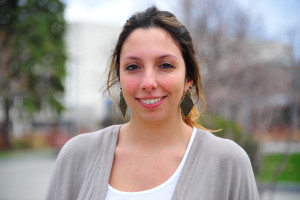Belgian-born student fights women’s oppression

Tyler McNeil
Creative Editor
Belgian-born student Emanuela Celili sometimes lies wide awake at night thinking about the oppression of women and children across the globe.
“I have nights where I can’t really sleep because I keep thinking about a child getting raped or a child in hunger. I can’t go on with my life just making money and being happy with all of this happening,” said Celili, who plans to travel to Guatemala to help starving children in February 2016.
Celili, the first in her mother’s family to attend college, hopes to study globalization next semester at UAlbany to pursue a career as a translator and activist for women’s rights in the United Nations in Europe. “I’ve always hated women being undermined by men, so I always told myself that I would do something about it. I’m pretty determined. I always tell my Mom, ‘You’re going to see me on television. I’m going to end this,’” said Celili, who is fluent in four languages.
“We learn a lot in Europe about prostitution and women being in the Middle East and they can’t drive, they can’t vote, and they can’t do a lot. They’re trying to break from the religion, and they need help,” Celili said.
Celili has made multiple presentations against prostitution and human trafficking, stemming from previous experiences back in Europe. “I would go to a Starbucks with my friends to get coffee, and there would be a bunch of young women against the other side of the glass. I didn’t know what was going on,” said Celili.
According to an official Belgian government estimate, 80,000 people visit prostitutes in Belgium each day. The United Nations Office of Drugs and Crime ranks Belgium as a top destination for human trafficking.
Aside from fighting prostitution, Celili’s primary mission is to stamp out female genital mutilation (FGM). “I always wondered, ‘Are you kidding? Isn’t anyone stopping them?’ There are people trying to stop them, and I want to be one of them,” she said. According to the World Health Organization, more than 125 million girls and women in 29 countries across Africa and the Middle East have been subjected to FGM.
Many communities that practice FGM believe it will prevent marital infidelity and premarital sex. FGM, which is considered a human rights violation by the United Nations, can cause severe bleeding, urination problems, cysts, infections, infertility, and childbirth complications.
Last year, Celili was hoping to go home to Europe to further her education at a superior school there. When she met her current boyfriend, last year, exercising at a local gym, her plan to further her education back home shifted. “I knew it was a sign. I can’t leave,” she said.
Celili came to the Capital Region in 2007, moving to Colonie with one half-sister and three stepsisters after her mother married a GE chemical engineer she had met at a conference in Brussels. “I didn’t really like leaving Europe and everything, because I knew it was a bad sign to give everything up to come here,” Celili said.
Throughout middle school and high school in Colonie, Celili was often looking for a sign to direct her back to Brussels. “I had this plan that I didn’t want to make friends because I wanted to move back to Belgium, but it obviously didn’t last long. I couldn’t go through the cafeteria without friends,” Celili said.
Celili missed the last two years of her grandmother’s life when she came to the United States. She revered growing up with her grandmother, who influenced her to explore art history, classical films, and the world beyond Belgium. “We couldn’t really watch cartoons, so we would watch documentaries,” she recalled.
In the eight years since arriving in the United States, Celili has slowly adapted to American culture, losing her accent and growing accustomed to the changes in her familial structure. “I used to to insult [my stepfather] in French because he wouldn’t understand me,” she said.
She considers her career prospects to be rushed in the United States. “I was more laid-back in Belgium, and now I come here and I have to know everything I want to [do],” said Celili.
Celili also recalls negative aspects of being brought up at strict Catholic schools in Brussels. “They told you that if you were gay or you performed any sin, you would go to hell. They would tell you that in your face,” recalled Celili.
As a child, the now-19-year-old student was raised to follow strict rules in Brussels private schools, including the prohibition of makeup, hair spray and hair gel. During her first week at Sand Creek Middle School, Celili was exposed to teenage pregnancy and sexual education. “I lost a lot of my religion [in the United States],” she said. “I didn’t feel like a kid anymore. I felt like I was forced to become older.”
She recalled coming home after watching a sexual education video in middle school. “I didn’t know any of that stuff. My mom was so shocked when I came home, because I had so many questions.” According to Celili, her mother eventually regretted her restrictive education in Brussels.
Despite adjusting to American culture, Celili identifies as a global citizen. She wishes to embark on humanitarian missions with her boyfriend for a year after graduating from UAlbany. “He knows I’m so against injustice and I need to travel. I can’t be in one place for too long. I’ll go crazy.”
